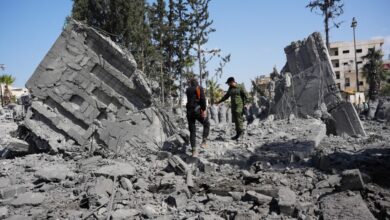Syrian Democratic Forces hands over alleged Italian ISIS member
Authorities in northeastern Syria have handed to Italy one of its citizens accused of belonging to Islamic State, a spokesperson said on Saturday, June 29.
“Italian jihadi Samir Bougana (aka Abu Abdullah) who had been captured fleeing ISIS and had been imprisoned since then was handed over to Italian government over their request,” Mustafa Bali, the head of the Kurdish-led Syrian Democratic Forces press office tweeted, using a different acronym for ISIS.
He did not specify when it took place or whether or not Bougana had already left the country.
Bougana – also known as Abu Hureyre al-Muhajir or Abu Abdullah al-Muhajir – was captured by special forces from the People’s Protection Units (YPG) near Raqqa in August 2018 as he tried to flee into Turkey.
The YPG makes up the bulk of the SDF, the U.S.-led Coalition-backed alliance of Kurds, Arabs and Christians that spearheaded the fight against ISIS.
The YPG said at the time he was responsible for weapons shipments to ISIS and “has been in charge of the activities of the ISIS foreign fighters,” and in a video released by the YPG, Bougana said in Italian that he was a member of ISIS and that he intended to cross the border into Turkey with his wife and daughters to seek help from the Italian consulate return to Italy.
It was unclear whether his wife and daughters were in SDF custody.
Bougana’s transfer is part of a wider effort by the Kurdish-led administration to rid itself of the dregs of the ISIS proto-state.
Following the collapse of the group’s territorial control in March, alleged ISIS fighters from nearly 50 countries have been detained in Syria and Iraq.
Over 11,000 of their family members are being held in Syria’s al-Hol camp alone.
The Kurdish-led autonomous administration in northern Syria has repeatedly warned it did not have the means to put such large numbers on trial or even maintain the camp.
The SDF has called for a special international tribunal to be set up to try detained ISIS members in Syria, while Iraq has offered to detain and try accused Islamic State members in exchange for millions of dollars. Some European nationals have been transferred across the border to Iraq, where a Baghdad court sentenced the last of 11 French nationals to death on charges of ISIS membership.
Repatriation is a sensitive issue for Western nations including France and the United Kingdom, which have experienced attacks by homegrown extremists and have little interest in seeing more return.
There are also concerns that it could prove difficult to successfully prosecute fighters in European courts for crimes committed in Iraq or Syria.
The U.K. has gone so far as stripping ISIS members of citizenship, while France has said it will repatriate only orphans.
Children and sometimes women have been repatriated from Iraq and Syria to various countries including Germany, Kazakhstan, Turkey, Uzbekistan, Norway, Australia, the Netherlands and France.
The United States, however, has repeatedly urged Western countries to take their nationals back and has repatriated some of its own, including three ISIS fighters and several American women and children.
On Thursday, it warned European countries they were making a “bad decision” by leaving their nationals in Syria instead of repatriating them to face justice.
Also last week, the United Nations’ rights chief called for countries to repatriate Syria-based family members of suspected foreign fighters, including some 29,000 foreign children of ISIS members.
With reporting from AFP











